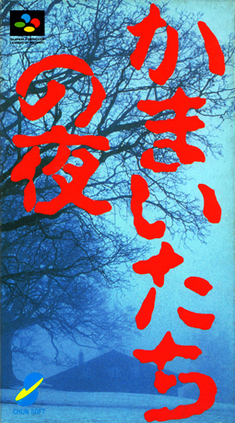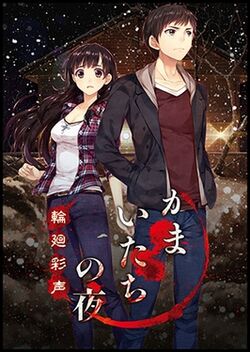Software:Kamaitachi no Yoru
| Kamaitachi no Yoru | |
|---|---|
 Super Famicom cover art | |
| Developer(s) | Chunsoft |
| Publisher(s) |
|
| Director(s) | Kazuya Asano |
| Producer(s) | Koichi Nakamura |
| Writer(s) | Takemaru Abiko |
| Composer(s) | Kota Kano Kojiro Nakashima |
| Platform(s) | Super Famicom, PlayStation, Game Boy Advance, PC, mobile, iOS |
| Release | |
| Genre(s) | Visual novel, adventure |
| Mode(s) | Single player |
Lua error in Module:Lang/utilities at line 332: attempt to call field '_transl' (a nil value)., released in English as Banshee's Last Cry,[1] is a visual novel developed and published by Chunsoft for the Super Famicom in 1994. It was later ported to other consoles, and was released on the Virtual Console service in Japan for Wii in 2007 and Wii U in 2013. An English localized version of the game was translated by Jeremy Blaustein and was released for Android and iOS by Aksys Games in 2014.[1][2][3] The game is the second sound novel by Chunsoft and brought a myriad of other companies to develop similar games. The term "sound novel" was a registered trademark, but is regarded as a genre. The game was a financial success. It sold 750,000 units for Super Famicom[4] and over 400,000 units for PlayStation.[5] The game sold 1.25 million units with remakes and ports in April 2002.[6] A remake, Kamaitachi no Yoru: Rinne Saisei, was released for PlayStation Vita in 2017 and ported to Windows in 2018.
Gameplay
The player reads the text on a gamebook.
Plot
Kamaitachi no Yoru follows the characters Toru (Max in the English localization) and his girlfriend Mari (Grace in English), who stay at a ski lodge when a snowstorm takes place. One of the fellow lodge guests are killed and the characters are drawn into a murder mystery, while being cut off from contact with the outside world.
Development
This section does not cite any external source. HandWiki requires at least one external source. See citing external sources. (May 2023) (Learn how and when to remove this template message) |
The game was revealed alongside a contest for readers to write related storylines. Ten of such stories were published in a book titled Anata dake no Kamaitachi no Yoru (あなただけのかまいたちの夜 lit. "Your Own Night of the Sickle Weasels"). This book was a success. A similar competition started upon the release of Kamaitachi no Yoru 2. It went out of print after many years, but was re-published when the sequel came out.
Music
Kōjirō Nakashima and Kōta Katō composed the game. The soundtrack gained significant popularity and was reused in television shows about Aum Shinrikyo. Two songs, "Sequence" and "Two People Return Alive" were orchestrated for the fourth volume of Orchestral Game Music Concerts.
Graphics
Background images included the lodge in Hakuba, Nagano.[clarification needed] Exceptions are the background for bathrooms and the wine cellar, which were done with miniatures. All characters have silhouettes. Banshee's Last Cry changed the setting (including its graphics) to British Columbia.
Ports
Releases
The game was ported to PlayStation on December 3, 1998 and for Game Boy Advance on June 28, 2002. It was released on SoftBank Mobile on April 1, 2002, and on PC on July 1, 2002. i-mode released it on January 30, 2004. The story had minor changes for the script of Kamaitachi no Yoru × 3 for PlayStation 2. Aksys Games released the game in English for iOS entitled Banshee's Last Cry in January 2014.[7]
Changes
- PlayStation version
- A flow chart was added and choices were colored according to whether choosing in previous arcs
- The player may replay the scenes
- Vibration added
- Two stories were added
- Changes in unlocking the extra storylines and parodies
- Improved graphics
- Added background information on characters
- Game Boy Advance version (comparison with PlayStation version)
- The characters were changed after the ones for the sequel
- A commercial message for the sequel can be unlocked
- No vibration
- Two extra stories were excluded after lacking cartridge spaces
- Some minor changes in the script
Remake
| Kamaitachi no Yoru: Rinne Saisei | |
|---|---|
 Cover art | |
| Developer(s) | 5pb.[lower-alpha 1] |
| Publisher(s) | 5pb. |
| Artist(s) | Alpha |
| Writer(s) | Ryukishi07 |
| Platform(s) | PlayStation Vita Microsoft Windows |
| Release | PlayStation Vita
|
| Genre(s) | Visual novel, adventure |
| Mode(s) | Single player |
A remake developed and published by 5pb., Kamaitachi no Yoru: Rinne Saisei, was released in Japan for PlayStation Vita in 2017 and ported to Windows in 2018. The remake has a new Japanese cast, new art by Sharin no Kuni: The Girl Among the Sunflowers artist Alpha and an additional scenario written by Ryukishi07.[8]
Related media
Radio drama
A radio drama was released on Compact Disc. The characters appeared in a different story-line with biochemical weapons. It stars Hikaru Midorikawa and Yumi Tōma.
Television drama
The two-hour drama series was aired by Tokyo Broadcasting System on July 3, 2002. Kamaitachi no Yoru 2 was released on July 18 of the same year, and the first edition of the game contained a bonus DVD of the entire drama. Like the radio drama version, the television is not a rendition of the actual game (the premise is that the fans gathered to shoot a film based on the game, when one of the characters are killed). It recreated the tense and mysterious atmosphere.
Reception
Famitsu scored the Game Boy Advance game 31 out of 40,[9] and for Super Famicom for 30 out of 40.[10]
See also
- Otogirisō
- Machi (video game)
- 428: Shibuya Scramble
Notes
- ↑ Development support by Spike Chunsoft.
References
- ↑ 1.0 1.1 1.2 "Tales of Murder Await You – - Aksys Games". http://www.aksysgames.com/2014/01/24/tales-of-murder-await-you/.
- ↑ Karen [@Aksys_June] (25 January 2014). "The English localization of Kamaitachi is out on iTunes today (Android version coming soon)! I worked on it!". https://twitter.com/Aksys_June/status/426873628236333057.
- ↑ "Aksys Games Releases Kamaitachi no Yoru Visual Novel on iOS". Anime News Network. January 24, 2014. http://www.animenewsnetwork.com/news/2014-01-24/aksys-games-releases-kamaitachi-no-yoru-visual-novel-on-ios. Retrieved January 24, 2020.
- ↑ "Press Release: 「au one Market」にて Android™搭載スマートフォン対応アプリ". Chunsoft. 2010-11-19. Archived from the original on 23 March 2016. https://web.archive.org/web/20160323021326/http://dwango.co.jp/pdf/news/group/2010/101119.pdf. Retrieved 29 December 2019.
- ↑ "業界に一石を投じたジャンル"サウンドノベル"を今一度振り返る" (in ja). ねとらぼ (ITmedia). July 26, 2006. https://nlab.itmedia.co.jp/games/articles/0607/26/news062_2.html. Retrieved 29 December 2019.
- ↑ "チュンソフト、怖さの中の美しさを描く「かまいたちの夜2」。ゲーム業界外のクリエイターが集結". Impress Watch (Impress Corporation). 2002-04-03. https://game.watch.impress.co.jp/docs/20020403/chun.htm. Retrieved 29 December 2019.
- ↑ "Aksys Games Releases Kamaitachi no Yoru Visual Novel on iOS". http://www.animenewsnetwork.com/news/2014-01-24/aksys-games-releases-kamaitachi-no-yoru-visual-novel-on-ios.
- ↑ "Kamaitachi no Yoru remake announced for PS Vita [Update"] (in en-US). 2016-11-15. https://www.gematsu.com/2016/11/kamaitachi-no-yoru-remake-announced-ps-vita.
- ↑ ゲームボーイアドバンス - かまいたちの夜 ~アドバンス~. Weekly Famitsu. No.915 Pt.2. Pg.122. 30 June 2006.
- ↑ おオススメ!! ソフト カタログ!!: かまいたちの夜. Weekly Famicom Tsūshin. No.335. Pg.115. 12–19 May 1995.
External links
- Official page (iOS version)
- Virtual Console page (in Japanese)
- Knulp (the ski lodge used in background graphics) (in Japanese)
- Instruction manual (Super Famicom) at Giant Bomb
- Kamaitachi no Yoru at The Visual Novel Database
